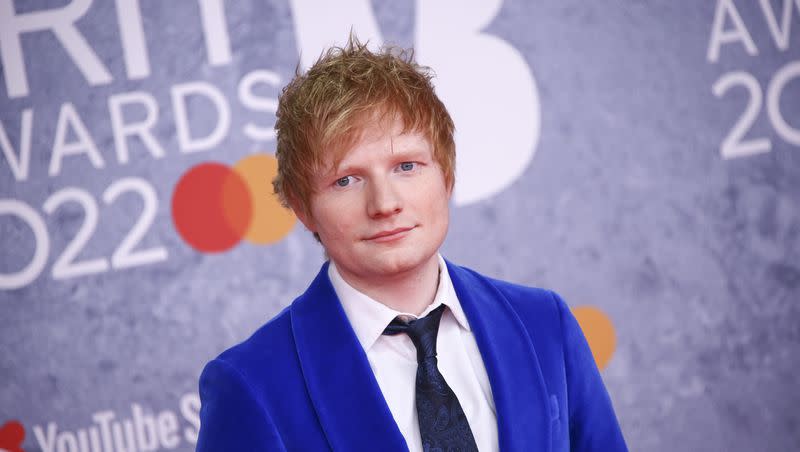‘I am just a guy with a guitar who loves writing music’: Ed Sheeran speaks out after winning copyright trial

- Oops!Something went wrong.Please try again later.
- Oops!Something went wrong.Please try again later.
A copyright infringement trial that led a frustrated Ed Sheeran to perform his guitar in court has come to an end.
On Thursday, the jury reached an unanimous verdict in favor of Sheeran, who was accused of copying parts of Marvin Gaye’s hit “Let’s Get It On” in his Grammy Award-winning song “Thinking Out Loud,” NBC News reported.
During the trial, Sheeran had said he would end his career if he was found at fault.
I am obviously very happy with the outcome of the case, and it looks like I’m not going to have to retire from my day job after all, Sheeran said in a statement on Thursday, per Entertainment Tonight. But, at the same time, I am unbelievably frustrated that baseless claims like this are allowed to go to court at all.
If the jury had decided this matter the other way, we might as well say goodbye to the creative freedom of songwriters, he continued. We need to be able to write our original music and engage in independent creation without worrying at every step of the way that such creativity will be wrongly called into question.
I am just a guy with a guitar who loves writing music for people to enjoy. I am not and will never allow myself to be a piggy bank for anyone to shake. ... I want to thank the jury for making a decision that will help to protect the creative process of songwriters here in the United States and around the world.”
Related
What is the Ed Sheeran copyright infringement trial?
The family of Ed Townsend, co-writer of “Let’s Get It On,” sued Sheeran for copyright infringement in 2017, “claiming ‘Thinking Out Loud’ copied the ‘heart’ of Gaye’s song including its melody, harmony and rhythm,” the Deseret News previously reported.
It took six years for the trial to reach a Manhattan federal court, and it marks the third copyright lawsuit Sheeran has faced regarding the connections between the two songs, per Deseret News.
Throughout the trial — and with a guitar to amplify his argument — Sheeran argued that his song was based on a common chord progression that is a fundamental building block of pop music.
Attorney Ben Crump, who represented Townsend’s relatives, showed what he called “smoking gun” evidence in court — a video from a Sheeran concert where the 32-year-old singer-songwriter performs “Thinking Out Loud” and “Let’s Get It On,” CBS News reported.
In response, Sheeran said artists often perform mashups and that he has previously combined “Thinking Out Loud” with Van Morrison’s “Crazy in Love” and Dolly Parton’s “I Will Always Love You,” according to Daily Mail.
“I mash up songs at lots of gigs,” he said, per Daily Mail. “Many songs have similar chords. You can go from ‘Let It Be’ to ‘No Woman No Cry’ and switch back. And quite frankly, if I’d done what you’re accusing me of doing, I’d be quite an idiot to stand on a stage in front of 20,000 people and do that.”
On the stand, he played the guitar to illustrate his songwriting process, and strummed the four-chord progression he’s accused of stealing while singing Morrison tracks like “Tupelo Honey” and “Crazy Love,” according to The New York Post. In fact, Sheeran even said that his record label referred to “Thinking Out Loud” as “the Van Morrison song,” The Associated Press reported.
“Once we had written and Ed started playing it from the phone, we both said it was a Van (Morrison) song,” Amy Wadge, who co-wrote the song with Sheeran, testified in court, per The New York Post, adding that she didn’t think of “Let’s Get It On” during the songwriting process. “It had the same sort of feel as a Van Morrison song.”
During closing arguments on Wednesday, Sheeran’s lawyer, Ilene Farkas, said the trial should “never have been brought,” the Independent reported.
“Ed Townsend did not create these basic musical building blocks,” Farkas said, per the Independent. “Ed Townsend was not the first songwriter to use and combine these elements. It was not original.”
U.S. District Court Judge Louis Stanton told jurors that the lawyers representing Townsend’s relatives needed to “prove by a preponderance of the evidence … that Sheeran actually copied and wrongfully copied ‘Let’s Get It On,’” Variety reported.
What happens after the Ed Sheeran trial?
The music industry held a deep interest in this case, which explored how much of a song can be protected by copyright, The New York Times reported.
In closing arguments, Farkas said Sheeran losing the case would be detrimental to the music industry: “Creativity would be stifled for fear of being sued,” she said, per The New York Times. A lawyer for Townsend’s relatives, meanwhile, urged jurors to not let Sheeran’s celebrity status sway their verdict and that they were looking to give Townsend proper credit.
“No one wants to damage creativity,” Keisha Rice said, according to The New York Times. “Plaintiffs simply want to discourage theft.”
Townsend’s relatives also wanted to keep Sheeran from performing “Thinking Out Loud” during his concerts, Insider reported.
In other news, a documentary on Sheeran, titled “The Sum of It All,” is now available for streaming on Disney+. The singer-songwriter is also releasing a new album, “Subtract,” on May 5, and will fill in as a judge on “American Idol” on May 7, per CNN.

